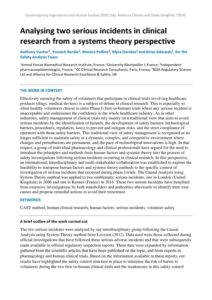| Document | Author Anthony Vacher, Yannick Bardie, Monica Pollina, Myra Daridan and Brian Edwards, for the Safety Analysis Team |
| Abstract Effectively ensuring the safety of volunteers that participate in clinical trials involving healthcare products (drugs, medical devices) is a subject of debate in clinical research. This is especially so when healthy volunteers choose to enter Phase I (first-in-human) trials where any serious incident is unacceptable and undermines the confidence in the whole healthcare industry. As in other industries, safety management of clinical trials rely mainly on a traditional view that aims to avoid serious incidents by the identification of hazards, the development of safety barriers (technological barriers, procedures, regulation, laws) to prevent and mitigate risks, and the strict compliance of operators with these safety barriers. This traditional view of safety management is recognised as no longer sufficient to maintain safety in a dynamic, complex, and competitive environment where changes and perturbations are permanent, and the pace of technological innovations is high. In that respect, a group of individual pharmacology and clinical professionals have argued for the need to introduce the principles and methods from human factors and systems theory into the process of safety investigations following serious incidents occurring in clinical research. In this perspective, an international, interdisciplinary and multi-stakeholder collaboration was established to explore the feasibility to transpose human factors and systems theory methods to the specific context of investigation of serious incidents that occurred during phase I-trials. The Causal Analysis using System Theory method was applied to two emblematic serious incidents, one in London (United Kingdom) in 2006 and one in Rennes (France) in 2016. These two serious incidents have benefited from extensive investigations by both stakeholders and authorities afterwards to identify their root-causes and propose remedial actions to avoid their recurrence. |

